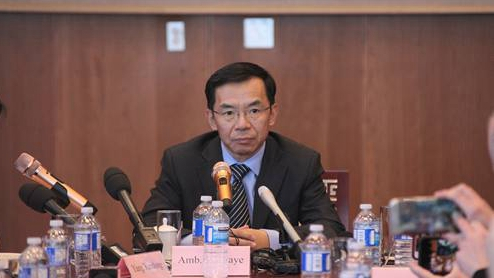
Politics
15:20, 18-Jan-2019
No retaliation against Canada's arrest of Huawei CFO: Chinese ambassador
CGTN

China's enforcement of compulsory measures against two Canadian citizens was not retaliation against Canada for unwarrantedly arresting of Huawei CFO Meng Wanzhou last month, Chinese ambassador to Canada Lu Shaye said on Thursday.
He made the marks when asked by the Globe and Mail – a Canadian newspaper – during a news conference on Thursday at the Chinese embassy in Ottawa.
"The two issues are of a completely different nature," Lu noted.
Meng was arrested without violating any Canadian law, while the two Canadians were investigated for legal charges, he added.
China confirmed on December 13, 2018 that two Canadian nationals –business consultant Michael Spavor and former diplomat Michael Koverig – are being investigated on suspicion of “engaging in activities that endangered China's national security” as tensions rose between Beijing and Ottawa over the arrest of Meng on a U.S. extradition request on December 1, 2018, a top Chinese telecom executive in Canada.
Lu said China is a country under the rule of law, and he wished Meng's case be properly resolved so as to restore bilateral relations and friendship as soon as possible.
Possible repercussions for Huawei 5G ban
"There would be repercussions," Lu replied when asked whether China is worried if Canada bans technology firm Huawei from supplying equipment to Canadian 5G networks.
Canada is currently studying the security implications of 5G networks, but unlike its allies including the U.S., Australia and New Zealand, Canada has not announced Huawei equipment will be excluded.
Lu reiterated that the “Five Eye Alliances” countries, including Australia, Canada, New Zealand, the UK and the U.S., have accused Huawei devices of threatening their national security without providing any solid evidence. He stressed that the laws of the Western countries are the most evidence-oriented, and allegations lack of it cannot last long.
“As for the consequences of the Canadian government's ban on Huawei's participation in the 5G project, I don't know, but I believe there will be consequences,” Lu said through an interpreter, urging Ottawa to “make a wise decision on this issue.”
Canadian Prime Minister Justin Trudeau accused Beijing of arbitrarily using the death penalty on the retrial of Canadian drug smuggler Robert Lloyd Schellenberg and called world leaders to solicit their support. China's Foreign Ministry on Tuesday expressed strong dissatisfaction and slammed Trudeau's remark for lacking "basic spirit of rule of law".
Lu said when Canadian Foreign Minister Chrystia Freeland went to the World Economic Forum in Davos next week she should avoid "microphone diplomacy" and not try to rally support.
"If Canada has a sincerity of resolving these issues, Canada will not do such things. We hope Canada thinks twice before making any actions," he said.
In response, Freeland said Canada had no intention of changing its approach.
(Cover: China's Ambassador to Canada Lu Shaye speaks during the news conference at the Chinese embassy in Ottawa on January 17, 2019. /Photo via the official website of the Chinese embassy in Canada)
(With inputs from Reuters)

SITEMAP
Copyright © 2018 CGTN. Beijing ICP prepared NO.16065310-3
Copyright © 2018 CGTN. Beijing ICP prepared NO.16065310-3